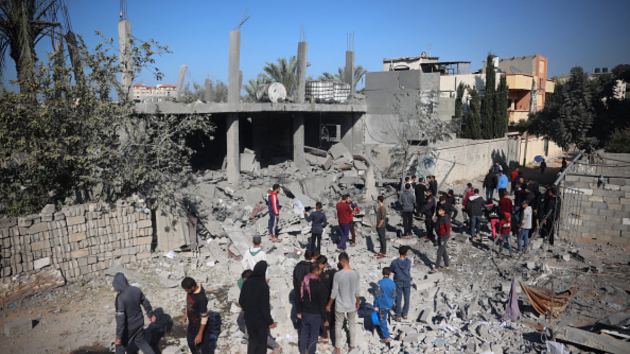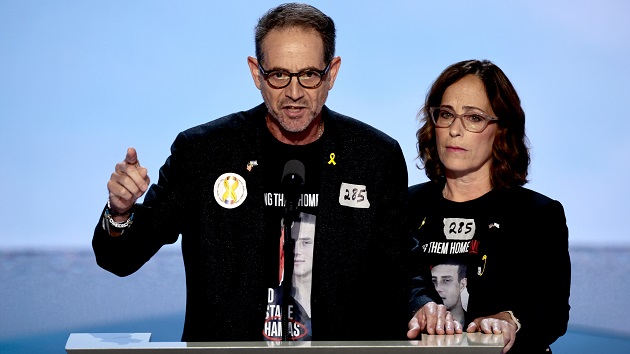Georgia at ‘tipping point’ as pro-West protesters clash with security forces
Written by ABC Audio ALL RIGHTS RESERVED on December 2, 2024
(LONDON) — The ancient streets of Georgia’s capital city were again choked with smoke on Sunday night, as a fourth consecutive night of anti-government protests descended into running street battles between pro-Western demonstrators and security forces.
Protesters in Tbilisi gathered behind makeshift barricades and launched fireworks toward lines of armored police, who sought to disperse the demonstrations with water cannons, tear gas and baton-wielding charges.
More than 200 people have been arrested during four nights of protests, the Georgian Interior Ministry said. Tbilisi has been the core of the unrest, but protests have also been reported in the Black Sea city of Batumi and elsewhere in the south Caucasus nation, which is bordered by Russia to the north and Turkey to the southwest.
The protests erupted after Prime Minister Irakli Kobakhidze — of the Georgian Dream party founded by elusive billionaire Bidzina Ivanishvili, who made his fortune in Russia — announced last week that Tbilisi would suspend European Union membership talks for four years.
Kobakhidze accused the bloc of “blackmail and manipulation” over its criticism of Georgia’s recent parliamentary election. Georgian Dream claimed victory in the October contest, which was beset by allegations of electoral fraud and voter suppression.
EU membership ambitions were central to Georgian Dream’s election manifesto. The party framed a vote for the pro-Western opposition as a vote for renewed war with Russia, which in the 2008 Russo-Georgian war cemented its control of around 20% of Georgian territory in collaboration with local separatist allies.
Mass protests failed to materialize in the aftermath of the vote, despite the efforts of opposition leaders including President Salome Zourabichvili. But the government’s turn away from EU talks prompted significant anger among Georgians, a majority of whom support the goal of EU accession. The ambition to join the bloc is also enshrined in Georgia’s constitution.
Sunday night saw deepening violence, with security forces filmed beating protesters and detainees. More than 40 people have been hospitalized, according to Georgian authorities, with protesters and police among the injured.
Zourabichvili wrote on X on Monday that the “majority of the arrested protesters have injuries to their heads and faces, broken face bones, eye sockets, open wounds.”
Those detained “have been subjected to systematic beatings between arrest and transport to already overcrowded detention facilities,” the president added, citing information from lawyers representing the arrested.
Kobakhidze, meanwhile, said at a Sunday briefing that “any violation of the law will be met with the full rigor of the law.”
“Neither will those politicians who hide in their offices and sacrifice members of their violent groups to severe punishment escape responsibility,” Kobakhidze said.
The opposition has vowed to continue its protest campaign. Zourabichvili said she would not step down from the presidency when her term ends in December unless a new “legitimate” parliament is empowered to choose her successor.
Alexandre Crevaux-Asatiani, a spokesperson for the United National Movement opposition party, told ABC News during the weekend clashes that Ivanishvili — as the power behind the Georgian Dream party — “has been playing chess against the Georgian people for a long time.”
“It was just a question of time before he’d make a wrong move,” Crevaux-Asatiani said of Georgia’s richest man. “Looking at it as a self-inflicted wound would be assuming that his goal is to somehow maintain peace and stability in Georgia, which is not what he wants.”
Jonathan Eyal of the Royal United Services Institute think tank in the U.K., told ABC News that Georgia is at “a tipping point.”
The Georgian Dream government, Eyal said, could “crumble” if the demonstrators remain on the streets, “especially if their numbers grow, as they appear to have done over the weekend and if the president remains stuck in her position,” he added.
“The question, of course, is what happens then?” Eyal continued. “It’s more than just a fake election,” he said of the Georgian Dream’s retention of power. “It’s a state capture.”
“A lot will need to happen for the oligarchs to run away to Moscow,” Eyal said. “It’s really 50-50 at the moment.”
Kremlin spokesperson Dmitry Peskov told journalists at a Monday briefing that government authorities “are taking measures to stabilize, return the situation to calm.”
Russia, he said, “has not interfered and does not intend to interfere” in events in Georgia.
Peskov described the protests as “an internal matter,” though added that the demonstrations are an “attempt to stir up the situation” reminiscent of the 2014 Maidan Revolution in Ukraine that unseated pro-Russian President Viktor Yanukovych.
Dmitry Medvedev — formerly Russia’s president and prime minister, now serving as the deputy chair of Russia’s Security Council — wrote on Telegram that Georgia was “moving rapidly along the Ukrainian path, into the dark abyss.”
Medvedev framed the protests as an attempted “revolution,” which he predicted would end “very badly.”
Western leaders, meanwhile, have underscored concerns over the disputed October election results and the recent conduct of security forces.
The U.S. State Department condemned “the excessive use of force by police against Georgians” and announced it would suspend the U.S.-Georgia Strategic Partnership due to “anti-democratic actions” by Georgian Dream.
“We reiterate our call to the Georgian government to return to its Euro-Atlantic path, transparently investigate all parliamentary election irregularities, and repeal anti-democratic laws that limit freedoms of assembly and expression,” spokesperson Matthew Miller said.
The EU’s new foreign policy chief, Kaja Kallas, said the bloc stands “with the Georgian people and their choice for a European future.”
“We condemn the violence against protesters and regret signals from ruling party not to pursue Georgia’s path to EU and democratic backsliding of the country,” Kallas wrote in a post to X. “This will have direct consequences from EU side.”
ABC News’ Patrick Reevell contributed to this report.
Copyright © 2024, ABC Audio. All rights reserved.







